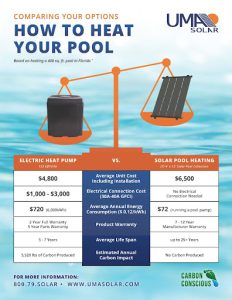If you’re a builder or a homeowner, here’s why you should consider Florida’s top solar pool heater over gas and electric for your home.
With the rise of building decarbonization ordinances and the increasing costs of gas and electric, there has never been a better time to make the move to solar for heating your swimming pool. Here’s how Florida’s top solar pool heater compares to the pool heating competition.
Rise Of Gas And Electric Costs
Gas has been the most popular way to heat pools, but we all know that the price of gas has gone up significantly lately. If you have a gas-powered pool heating system, that increase will be reflected in your gas bill.
Cost Of Heating With Gas
If you want to heat an 18,000-gallon pool from 52 degrees to 82 degrees Fahrenheit, it would take 12 hours with a gas heater. Using four therms per minute, you’ll pay $7.08/hour to heat your pool, for a total of $85. That is the cost to heat your pool one time.
Cost Of Heating With Electric
Electric pool heaters are also costly. In Florida, electricity is currently 12 cents per kilowatt hour. It takes 6.4 kilowatt hours to heat the same 18,000-gallon pool at a cost of around $100 for each heating session.
When heating with electricity, also consider the substantial infrastructure that needs to be added. You’ll pay about $1,000 – $3,000 to add a 40-amp breaker with GFCI by your pump box. You’ll also need a plumber to install piping underground. All those costs add up.
Installation vs. Maintenance Costs
The cost of installing an electric or gas pool heating system might be less than installing solar (don’t forget the added costs associated with an electric heater install), but where you’ll see savings is in maintenance costs. There are no ongoing costs associated with Florida’s top solar pool heater other than what you’re already paying for your pool pump to run.
Compare that to about 600 kilowatt hours per year to heat your pool with an electric heater, and you’ll save about $720 every year by going solar. How’s that for a return on investment?
Regulation Changes
Pool heating regulations may be changing in some areas. Many states have decarbonization ordinances in place or they’re in the works. What does this mean for you? It means that gas may not be an option for new home builds.
If you are a builder, we offer solutions at UMA Solar that help you become more carbon-conscious by adding solar electric, eco solar pool systems, and energy-efficient hot water tanks to new builds.
New home building codes may soon include decarbonization ordinances, so if you are a homeowner building a new home, you may need an option other than gas to heat your home and your pool. We work with builders and homeowners to reduce their carbon footprint with solar.
Fun Fact: By choosing solar over gas to heat your pool, you’ll save 5,520 pounds of carbon.
Every solar pool system we design and engineer comes with a Carbon Footprint Certification so you can feel good about your carbon-conscious decision.
Warranties
Anytime you make a major investment in your home, you should check on the length of the warranty on the equipment you purchase. You want the peace of mind that comes with knowing a repair or replacement will be covered if there is a manufacturer defect or if something else goes wrong. Solar wins the warranty award.
Gas and electric pool heaters typically come with warranties of two to five years. Our solar pool heating systems come with seven to 12-year warranties. That’s a big difference.
The Bottom Line
Now is the perfect time to consider Florida’s top solar pool heater. If you’re a builder or a homeowner looking for a pool heating system, gas might not be an option, and electricity costs are sky-high. Time to go solar.
If you have any questions about solar pool heating and why it’s a more cost-effective, eco-friendly option, contact UMA Solar today. We’re happy to answer all of your questions and connect you with a dealer in your area.
